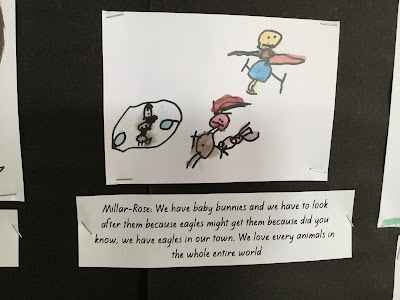“When one
tugs a single thing in nature,
he finds it attached to the rest of the world”
–
John Muir
As we have recently joined the Enviroschools movement and reflected for Bronze accreditation, we have been thinking about how we can support the children grow their environmental awareness. Part of my teacher inquiry also involved supporting children to “develop a strong vision of themselves as kaitiaki for a sustainable future”.
 |
| Ezra: We catch rats in rat traps |
 |
| Mana: We could look after bees cause them make honey. Cause we always need to be gentle to bees when we see them. |
 |
| Grace: We can look after sharks because in a boo from Elsie's library at school, people are catching sharks. I saw a few sharks on Blue Planet. |
As we run a very successful nature programme at Mairtown Kindergarten, and we incorporate environmentally sustainable practice into our programme, my initial thinking was that our children would be quite knowledgeable in this area and would have lots of knowledge to share with me. To begin with this was true, as our wonderful environmental warriors had sustainability at the forefront of their mind!
Anna: We could garden the soil and plant carrots
Patrick: Keeping earth nice
Jesse: Kaitiaki means you guard something
Ezra: Catching rats in rat traps
Teddie: Yeah and looking after the baby eggs
Bella: Don’t throw any rubbish on the road
Nikos: If we don’t have a world we won’t have anywhere to live
 |
| Levi: I make sure I don't step on the flowers because the bees need them |
 |
| Bella: At Kindergarten we clean the easels |
But then a different theme emerged, as many of our children began to talk about being “kaitiaki of the people” and nurturing and protecting the wairua of those around them so that as a collective, we can thrive.
Jesse: We care for our friends and the teachers. We can send presents to
people, that will make them feel really happy if we sent people a card. That's
being kaitiaki of the people
Joshua: Kaitiaki is being kind to people
Gabrielle: Remember the other time when I was looking after people at
Kindergarten? That is kaitiaki
Sharlee-Bea: I look after my sister. Take care of her and have a snuggle
on the couch
It was so interesting that the children naturally took this holistic view and seemed to know that the environment and those living within it could not succeed unless in mutuality. This relates to a Māori worldview of kaitiakitanga which considers the well-being of natural resources to be directly related to the well-being of the people. Having this vision of what it means to be a kaitiaki at Mairtown has opened our minds to new possibilities within our wider community. One of the guiding principles or ngā mātāpono of the Enviroschools kaupapa is to create sustainable communities. These are communities which “act in ways which nurture people now and into the future”
 |
| Gabrielle: Remember the other time when I was looking after people at Kindergarten? That is kaitiaki |
 |
| Millar-Rose: We have baby bunnies and we have to look after them because eagles might get them because did you know, we have eagles in our town. We love every animals in the whole entire world |
“Without a doubt our
most significant resource and potential lies in our people and so looking into
the future, how we nurture and support each other’s potential and how we plan
for the future will have a significant bearing on what we achieve for ourselves
and future generations”
(Te Rūnanga o Ngāti Awa, 2010, p.4)
Florence: I’m going to be a kaitiaki of the whole wide
world. Do you know that’s a huge job for one person, but everyone can help

No comments:
Post a Comment